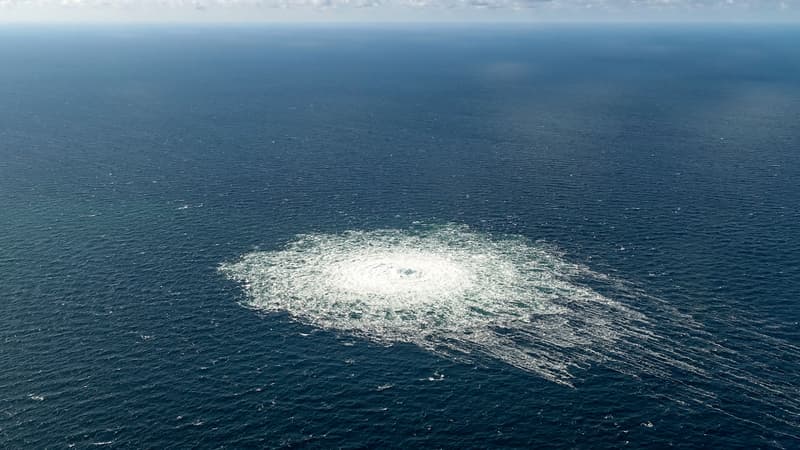Out of service due to the war in Ukraine, the Nord Stream gas pipelines linking Russia with Germany under the Baltic Sea were both affected by spectacular leaks preceded by underwater explosions, promising the European Union the “strongest possible response” to this ” sabotage”. “.
The three large leaks identified since Monday off the Danish island of Bornholm, between southern Sweden and Poland, are visible on the surface with bubbles ranging from 200 meters to a kilometer in diameter, the Danish army announced on Tuesday. supporting images. The Nord Stream 2 gas pipeline had suffered a sharp drop in pressure on Monday, followed a few hours later by the Nord Stream 1, which follows the route under the Baltic.
“Act of Sabotage”
European Commission President Ursula von der Leyen wrote on Twitter late Tuesday that she had “discussed the Nord Stream sabotage act” with Danish Prime Minister Mette Frederiksen.
Shortly before, the Danish Prime Minister had declared that “the clear opinion of the authorities is that these are deliberate acts. We are not talking about an accident.”
“There have been explosions and it is probably sabotage,” added the resigning Swedish Prime Minister Magdalena Andersson, who deals with the news after the lost elections on September 11. Like Denmark, Sweden does not see this as an act of aggression against it, since the incidents took place outside territorial waters, in the exclusive economic zones.
According to Copenhagen, the leaks should last “at least a week”, until all the gas has left the two structures. The Swedish seismic institute recorded two underwater explosions, “probably due to detonations”, before the incident, as did their Norwegian and Danish equivalents.
Suspicions against Russia
Objects of geopolitical pulse in recent months, the two oil pipelines operated by a consortium dependent on the Russian giant Gazprom are not operational due to the consequences of the war in Ukraine. But both were still full of gas. The Kremlin, towards which many eyes have been turned, said it was “extremely concerned”, believing that “no” hypothesis, including sabotage, should be ruled out.
In Kyiv, the advisor to the Ukrainian presidency, Mykhaïlo Podoliak, denounced “a planned terrorist attack” by Moscow, without providing evidence. The Polish prime minister also suggested Russia’s involvement. “We clearly see that this is an act of sabotage, which is likely to mark the next stage in the escalation of the situation in Ukraine,” said Mateusz Morawiecki, who just inaugurated a gas pipeline linking Norway with Poland on Tuesday.
“We are not excluding any scenario, but we are not going to speculate on the motives or the actors” that may be involved, explained Swedish Foreign Minister Ann Linde.
An incident that “is not ordinary” according to the consortium
On the US side, Washington, after refusing to “confirm” an act of sabotage, said it was examining information that the leaks were “the result of an attack or some kind of sabotage.” “If this is confirmed, it is clearly not in anyone’s interest,” Secretary of State Antony Blinken told reporters.
US National Security Adviser Jake Sullivan called it “apparent sabotage”. He tweeted that he spoke with his Danish counterpart, Jean-Charles Ellermann-Kingombe, about the “apparent sabotage of the Nord Stream pipelines.” The pipeline operator, the Nord Stream Consortium, acknowledged that “an incident where three pipelines simultaneously experience difficulties on the same day is unusual,” according to a spokesman.
Enhanced Surveillance
Denmark sent two military ships to the scene accompanied by helicopters and placed its energy infrastructure on orange alert, the second highest level of surveillance.
For its part, the Norwegian government has decided to “strengthen emergency preparedness with regard to infrastructure and facilities on land and at sea on the Norwegian continental shelf.” In its press release, Oslo mentions “increased drone activity” and says an investigation is underway.
Navigation and overflight ban
Nord Stream 2, completed in 2021, was intended to double the capacity to import Russian gas into Germany. Its commissioning was suspended in retaliation for the invasion of Ukraine. As for Nord Stream 1, Gazprom gradually reduced the volumes of gas delivered until the pipeline was completely shut down in late August, blaming Western sanctions for delaying necessary repairs at the facility.
Navigation within a radius of five nautical miles (about nine kilometers) around the three leaks was prohibited, as was their overflight within a radius of one kilometer. According to the Danish authorities, the incidents have no consequences for the safety or health of local residents. The direct environmental impact should also be limited, although unburned natural gas has a powerful greenhouse effect.
Source: BFM TV


